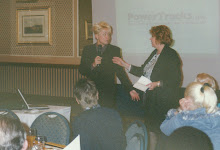People are always blaming their circumstances for what they are. I don't believe in circumstances. The people who get on in this world are the people who get up and look for the circumstances they want, and if they can't find them, make them.
~ George Bernard Shaw
Relying upon the old stories you tell yourself as the reasons why you are not able to get what you want may give you some comfort but it will never get you to where you want to go. While it may be difficult, at first, to give up those stories, it is entirely possible and people do it every day.
One very powerful way is to set a target date for achieving your goal. Companies, for example, know that sales goals are what often drive committed salespeople. They set their target numbers each month and the salespeople go about working toward that goal. How people achieve their goals by the target date is part mystery but also part common sense. Personally, I like the mystery because it means something larger than me is out there working on my behalf whenever I become crystal clear in my goals and set a target date to achieve goals. I don't need to understand it, I just need to accept it.
I can’t explain the ethereal forces behind this process but only know that the more I focus on achieving a specific goal within a specified timeframe, things begin to happen to move me in that direction. It happens every time without fail.
At first, the things that happen, the doors that open, seem to be nothing more than coincidences; and, perhaps, they are but there is a synchronicity to these events whenever my goals are aligned with my real purpose. Quite suddenly, the things I focus upon enlarge and offer opportunities to help me reach my goals. It is not without hard work, mind you, but, somehow, it doesn’t feel like hard work.
What happens on the common sense side is that once a goal is established and a target date set, you begin making decisions that steer you toward those goals. Often, when goals are fuzzy or you don’t have a hard timeframe to accomplish, poor time management occurs or you may pursue something that makes you feel like Sisyphus, of Greek mythology, eternally pushing a boulder up the hill only to have it roll back down and have to start all over.
So, the formula is pretty simple by starting with the end (goal) in mind:
1. Become really clear on what you want to achieve. If looking for that right career, state it, in writing. Writing it down is very important. But, make sure it is something you really want to do. Don’t worry that it may seem out of reach or is in an industry in which you don't have experience. The forces at work in the universe don’t care about any of that and will produce opportunities and deliver information to you for achieving that goal.
2. Set an “achieve by” date. This gives structure and a sense of urgency to reaching that goal so that, again, the universe aligns what you need to deliver by that date.
Do these two things consistently and your life will change.
Relying upon the old stories you tell yourself as the reasons why you are not able to get what you want may give you some comfort but it will never get you to where you want to go. While it may be difficult, at first, to give up those stories, it is entirely possible and people do it every day.
One very powerful way is to set a target date for achieving your goal. Companies, for example, know that sales goals are what often drive committed salespeople. They set their target numbers each month and the salespeople go about working toward that goal. How people achieve their goals by the target date is part mystery but also part common sense. Personally, I like the mystery because it means something larger than me is out there working on my behalf whenever I become crystal clear in my goals and set a target date to achieve goals. I don't need to understand it, I just need to accept it.
I can’t explain the ethereal forces behind this process but only know that the more I focus on achieving a specific goal within a specified timeframe, things begin to happen to move me in that direction. It happens every time without fail.
At first, the things that happen, the doors that open, seem to be nothing more than coincidences; and, perhaps, they are but there is a synchronicity to these events whenever my goals are aligned with my real purpose. Quite suddenly, the things I focus upon enlarge and offer opportunities to help me reach my goals. It is not without hard work, mind you, but, somehow, it doesn’t feel like hard work.
What happens on the common sense side is that once a goal is established and a target date set, you begin making decisions that steer you toward those goals. Often, when goals are fuzzy or you don’t have a hard timeframe to accomplish, poor time management occurs or you may pursue something that makes you feel like Sisyphus, of Greek mythology, eternally pushing a boulder up the hill only to have it roll back down and have to start all over.
So, the formula is pretty simple by starting with the end (goal) in mind:
1. Become really clear on what you want to achieve. If looking for that right career, state it, in writing. Writing it down is very important. But, make sure it is something you really want to do. Don’t worry that it may seem out of reach or is in an industry in which you don't have experience. The forces at work in the universe don’t care about any of that and will produce opportunities and deliver information to you for achieving that goal.
2. Set an “achieve by” date. This gives structure and a sense of urgency to reaching that goal so that, again, the universe aligns what you need to deliver by that date.
Do these two things consistently and your life will change.



